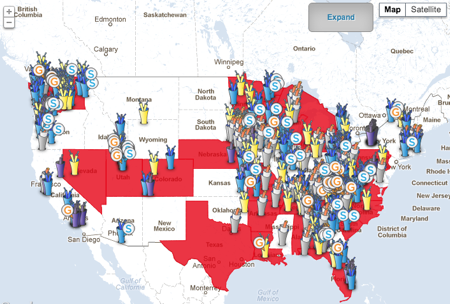Gig City Dreams: Chattanooga Leads the Way with Municipal Broadband
If asked to name the U.S. city that provides residents and businesses with the fastest municipal broadband, most people probably wouldn’t put Chattanooga, Tenn., at the top of the list. But according to a new map from the Institute for Local Self-Reliance, Chattanooga’s network offers faster connection speeds than any of the 341 other communities around the country with similar publicly owned fiber-optic or cable networks.
So exactly how did a relatively small city like Chattanooga come to be known as “the Gig City”?
Credit: Muninetworks.org
Government Technology took a look at the history of Chattanooga’s lightning-fast network, which began as the product of Electric Power Board (EPB), the city’s municipally owned utility company.
In 2007, EPB’s brain trust began work on a fiber-optic network that would stabilize and improve the city’s electric grid. The plan was that the network would enable EPB to not only detect but also repair outages, without much delay. This would automate the switches that control and route power across the grid, thereby eliminating the need for an EPB technician to drive to the outage and manually flip the switches, saving money as a result.
EPB calculated that the network’s automated features would create enough savings to pay for the infrastructure upgrades. The city secured the remaining $111 million through the federal stimulus.
Unveiled in 2010, after two years of work instead of the projected five years, the 1-gigabyte network stretches across 600 square miles and serves 170,000 residential homes and businesses.
So far, the new network has had the expected impact on the power grid. For example, during a particularly violent bout of tornados in 2011, three EPB radio communication sites went down, but the area covered by the fiber-optic network experienced only a minimal 5 percent loss of the communications network. The fiber-optic network does, however, have added benefits beyond stabilizing the power grid and cutting down on outages.
For one thing, EPB can offer Chattanooga citizens a host of telecom services, IP television and tiered levels of broadband service up to 1-gigabit upload/download speeds. Its packages start at 50 Mbps and go all the way up to 1000 Mbps.
Further, public services also enjoy the extra power provided by EPB’s wireless mesh network. Police officers can use the network to monitor security cameras and adjust the lighting in public spaces, such as parks. The superfast download speeds also let the fire department remotely download a building’s floor plan before head out to respond to an emergency.
City officials hope that Chattanooga’s broadband speeds and prices will draw businesses from larger cities that can’t provide the same service. The Gig City offers businesses of all sizes — but particularly the ever-important small business subset — Internet connection speeds that would make the businesses more efficient and responsive, without weighing them down with burdensome costs.
If Chattanooga can enhance its power service, give residents the luxury of faster Internet connections and enjoy an economic renaissance, perhaps other midsize and larger cities can use that template to do the same.








